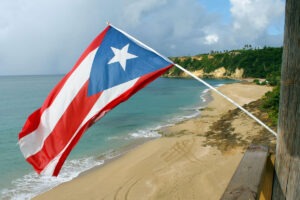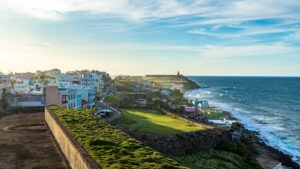
April 15, 2019; American Prospect
NPQ has steadily followed the situation of Puerto Rico and the challenges its people face, both because of the situation’s inherent importance and because we are witnessing in real time “the processes of building anew and recreating from disaster in a region where inequality is already extreme.” One disturbing reality being revealed is that federal long-term federal disaster recovery policy is grossly inadequate.
For instance, consider this, from Manuel Madrid of American Prospect: “Congress approved $20 billion last year to help Puerto Rico recover from Hurricane Maria in 2017. Less than $14,000 has been spent on the island.”
Where is the money? Over a year after Congress authorized $20 billion, most of the money remains stuck in bureaucratic limbo.
As of March 1st, less than $14,000 of the $20 billion approved by Congress has been spent on Puerto Rico post-disaster reconstruction activities, according to Department of Housing and Urban Development records. This is because the first disbursement of $1.5 billion to Puerto Rico only occurred in February of this year. The remaining $18.5 billion, notes Madrid, “has not even reached the island yet, stuck somewhere between the department’s rigorous planning requirements and its drawing up of grant agreements.”
Part of the problem is that unlike immediate disaster relief funding, the long-term disaster relief that Congress approved in early 2018 was set to be distributed through the Community Development Block Grant-Disaster Recovery program at the US Department of Housing and Urban Development (HUD).
Sign up for our free newsletters
Subscribe to NPQ's newsletters to have our top stories delivered directly to your inbox.
By signing up, you agree to our privacy policy and terms of use, and to receive messages from NPQ and our partners.
Unlike other disaster assistance programs, Madrid notes that, “HUD lacks the authority to issue emergency funds without first publishing lengthy grant requirements for each new disaster.”
“The result,” adds Madrid, is “a tangled web of red tape that has slowed the release of funds to recovering areas,” as detailed in a report issued last month by the US Government Accountability Office. The report was unsparing in its criticism. The report also noted that Puerto Rico was not the only community that was being forced to wait an inordinate period of time for promised federal disaster recovery funds. As Madrid explains:
As of January 2019, Texas had drawn down about $18 million (of $5 billion) for administration and planning only, and Florida had drawn down about $1 million (of $616 million) for administration, planning, and housing activities. Puerto Rico and the U.S. Virgin Islands had not drawn down any of the $1.5 billion and $243 million, respectively, they had been allocated. HUD lacks adequate guidance for staff reviewing the quality of grantees’ financial processes and procedures and assessments of capacity and unmet needs, and has not completed monitoring or workforce plans.
After waiting months for guidance, states and localities seeking aid must then submit a mountain of documentation to be approved by HUD. Once approved, a grant agreement is drafted, finalized, and signed.
For the initial $1.5 billion for Puerto Rico, an agreement was signed only in September—a full year after Hurricane Maria hit the island. By contrast, according to the GAO report, agreements were signed by May after hurricane Katrina hit, a difference of four months. The GAO, for its part, recommends that Congress authorize a permanent disaster assistance program that is better suited to address unmet needs in a timely manner, as well as other process reforms.
At a congressional hearing held early this month, Jenniffer González-Colón, who is Puerto Rico’s nonvoting Republican congressional representative, expressed her frustration at the slow speed of fund delivery: “We got 53 days until the next hurricane season, and the people of Puerto Rico will not have a robust system to face the new hurricane season. We can see [the recovery money], we can smell it, but we can’t touch [it]. That’s the main situation on the island.”—Steve Dubb













